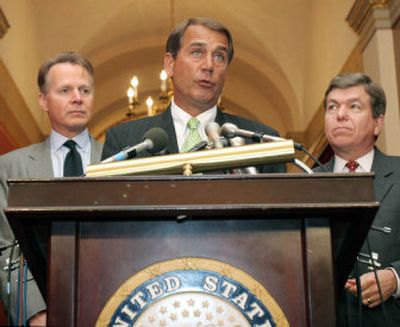Legal pressure building on Tom DeLay

WASHINGTON – Rep. Tom DeLay’s decision to leave Congress ends his political problems, but his legal woes may be far from over.
The former House majority leader announced his resignation three days after court documents revealed that federal investigators have uncovered evidence of corruption in his leadership office. Tony Rudy, former deputy chief of staff to the powerful Republican congressman from Texas, admitted in a plea agreement that he sold his influence to disgraced lobbyist Jack Abramoff while he was working for DeLay.
Rudy became the second former DeLay aide who’s agreed to cooperate with federal investigators in return for a more lenient sentence.
“Any rational person in (DeLay’s) position would be very concerned,” said Kendall Coffey, a former federal prosecutor who’s now a prominent defense lawyer in Miami. “Whether it’s working up the ladder at Enron or a drug organization, it’s classic strategy to work up by getting plea agreements and cooperation at each level.”
DeLay, who’s under indictment in Texas in a separate case involving his handling of campaign contributions, hasn’t been accused of any wrongdoing in the Abramoff influence-peddling scandal. The congressman says he was unaware of any illegal activity by Rudy or his former press secretary, Michael Scanlon.
Scanlon and Abramoff also are cooperating with prosecutors as part of a plea bargain.
DeLay said his decision to step down had nothing to do with Rudy’s plea bargain or any concerns about the criminal investigation.
“I have not been subpoenaed; I have not been talked to,” he told National Public Radio. “I know you, the press, has a hard time believing it, but the truth is I am not a target of this investigation. Abramoff has nothing to do with me.”
Even so, legal experts said DeLay should be worried that federal prosecutors seemed to have him in their sights.
“They’ve penetrated his inner sanctum with a guy who says he was doing things in his office,” said Stanley Brand, a Washington lawyer who’s defended about two dozen cases involving official corruption charges. “This case is just beginning.”
Stephen Saltzburg, a professor at the George Washington University Law School, said DeLay’s former aides almost certainly were feeling intense pressure to pass along any damaging information they had about their former boss or any other member of Congress.
Rudy and Scanlon each face up to five years in prison and a $250,000 fine for their admitted crimes. Abramoff faces up to 30 years. Passing along helpful information could save them years behind bars.
“In order to get substantial credit, you have to be able to give something,” Saltzburg said. “There’s going to be a lot of pressure on his former aides, if there’s anything there, to cooperate. People have a motive to point the finger, even if it shouldn’t be pointed.”
Lawyers who’ve worked at the intersection of politics and criminal law expressed skepticism about DeLay’s explanation that he stepped down because of concerns that he’d lose his re-election bid in November.
“The guy has a hide of titanium. This is not about his election; this is about his defense of the criminal investigation,” former federal prosecutor John P. Flannery II said. “The circle is closing on him for a federal indictment.”
Brand, whose previous clients have included members of Congress, said it wasn’t uncommon for lawmakers to shelve their political careers when faced with the possibility of criminal charges.
“He’s going to face hundreds of thousands of dollars in legal expenses if he gets charged and decides to defend himself,” Brand said. “It’s hard to focus on that and focus on re-election.”